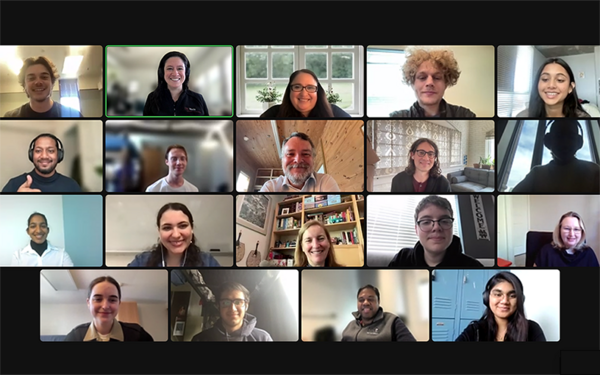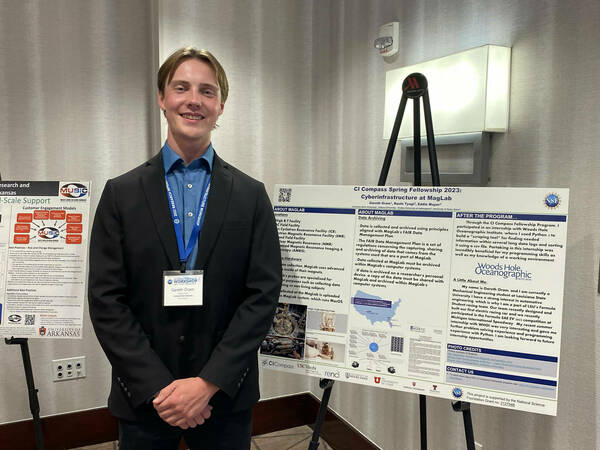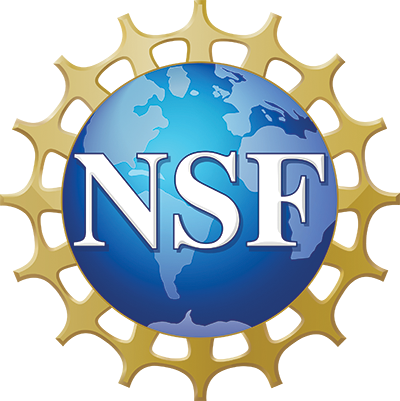Student Fellowships
CI Compass Fellowship Program (CICF) for Undergraduates
Students Fellows in CICF learn about real-world cyberinfrastructure challenges, and how to begin solving them for NSF Major Facilities

CI Compass, the NSF Cyberinfrastructure Center of Excellence, offers a distinctive Fellowship Program for undergraduate students pursuing studies in computer science, information science, data science, applied mathematics and statistics, embedded systems, communications, social sciences related to cyberinfrastructure, and other related fields.
Cyberinfrastructure, or CI, encompasses computing systems, data storage systems, advanced instruments, and data repositories, visualization environments, and people all linked together by software and high-performance networks to improve research productivity and enable breakthroughs otherwise not possible.1
The program provides Student Fellows the opportunity to:
- Learn about CI development and Major Facilities (MFs).
- Develop CI-related skill sets that are important to the work of MFs.
- Engage with CI Compass and MF personnel through a virtual training and research program, and related professional workshops/symposia.
CICF is open to all undergraduate students in the United States.
CICF Spring Program

During the academic Spring Program, Student Fellows participate in a virtual training program with CI Compass. This Spring Program has two components, 1) a Technical Skills Component and 2) a Data Lifecycle Component.
The technical portion of the Spring Program provides Student Fellows with experience in technical skills relevant to cyberinfrastructure (i.e., software engineering, cloud computing, data workflows, etc.). Click here for an example syllabus for the Spring Program.
The research skills program provides Student Fellows with contextual understanding of the MFs and related cyberinfrastructure through learning about the data lifecycle of specific MFs and engaging with guest speakers from MFs and the greater cyberinfrastructure community. In groups, Student Fellows research a specific MF to learn about its science mission, cyberinfrastructure, and data lifecycle, then present their research findings at the end of the Spring Program.
“Many of these scientific discoveries would never happen without cyberinfrastructure so, seeing the gleam in the student’s eyes when they see this connection between what they learn with classroom and how it can be applied to something that is impactful, that's very rewarding.” says Ewa Deelman, CI Compass PI.
Applications for the 2024 CICF Cohort are now closed. If you would like to be on the mailing list for next year's application, please fill out this form.
CICF is free to the Student Fellows, and may be taken for course credit depending on their institution's requirements. Additionally, CI Compass Student Fellows will be provided up to a $1,200 travel reimbursement to attend a computing-related domestic conference of their choice (restrictions may apply).
Summer Program Opportunities

Student Fellows have the option to apply for the Summer Program, which provides potential hands-on project-based learning experience at either an MF or a CI Compass institution. During the Spring Program, the CICF team will provide information and guidance on these potential Summer Program opportunities, as well as the opportunity to network and make connections with MF colleagues. While participation in CICF provides Student Fellows an advantage, the Summer Program is not guaranteed and requires an additional application process.
Details of the specific projects will vary, based on the institution’s needs. Student Fellows invited to participate in a summer project will be given a $720/week stipend. Student Fellows are expected to work 40 hours a week during their summer project. Programs range from 6-10 weeks. Some are in-person and others are remote.
Need more information?
The CI Compass Fellowship Program is directed by Angela Murillo, Director of CICF and Nicole Virdone, CI Compass Director of Outreach. For more information on the program, please email cicf@ci-compass.org.
Download these fliers if you would like to distribute them at your institution:






